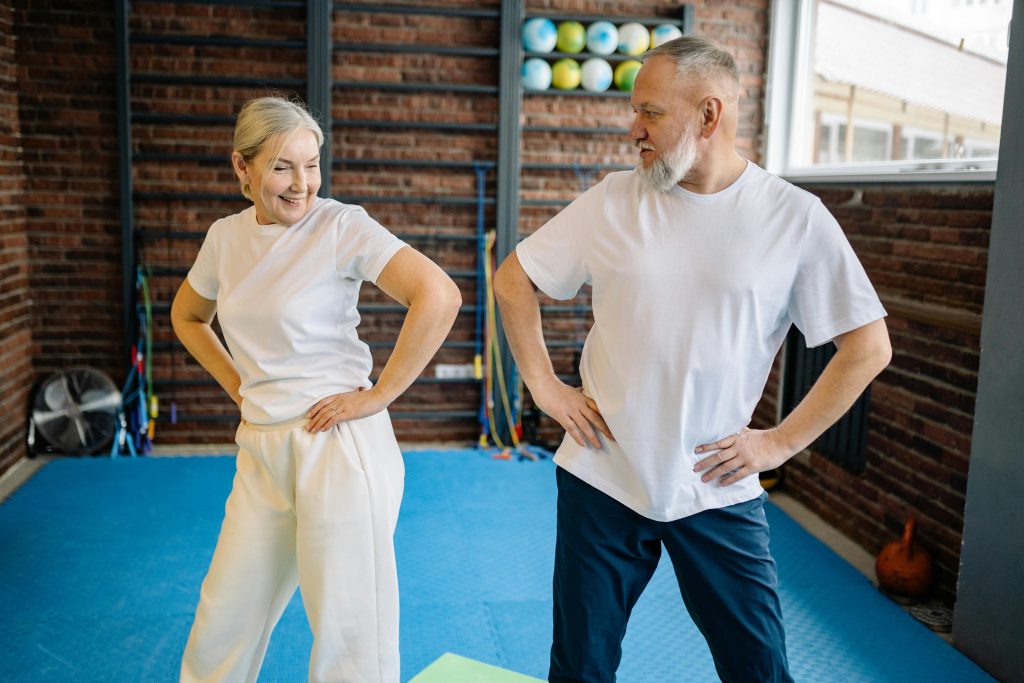Did you know that only 20% of gym-goers, including experienced exercisers and personal training clients, ask their trainers important questions about their fitness assessments? Understanding your body and progress is crucial for achieving your fitness goals. To ensure you, as the client, get the most out of your sessions and achieve your goal, here are 10 essential questions to ask your trainer about your fitness assessment. From understanding your results to tailoring workouts for optimal results, these questions will empower you on your fitness journey.

Question #1: What Is The Purpose Of A Fitness Assessment?
Understanding the purpose behind a fitness assessment helps you grasp its significance in your fitness journey. Trainers conduct these evaluations to establish a baseline of your physical condition, identify strengths and weaknesses, and tailor a workout program specifically for you. By assessing various fitness components, they can create a plan that aligns with your goals and current fitness level.
Question #2: What Components Are Included In The Fitness Assessment?
Knowing what components will be assessed provides insight into the thoroughness of the evaluation. Common components include cardiovascular endurance, muscular strength, muscular endurance, flexibility, body composition, and sometimes balance and coordination. Each component offers a different piece of the puzzle regarding your overall fitness.
Question #3: How Should I Prepare For The Fitness Assessment?
Preparation can impact the accuracy of your results. Your trainer may advise you on how to prepare, which often includes avoiding strenuous activity the day before, eating a balanced meal, staying hydrated, and wearing appropriate clothing. Proper preparation ensures that the assessment reflects your true fitness levels.
Question #4: What Can I Expect During The Fitness Assessment?
Understanding what to expect can ease any anxieties you might have. Your trainer will explain the specific tests and exercises you’ll perform, the duration of the assessment, and the type of equipment that will be used. This knowledge helps you mentally and physically prepare for the session.
Question #5: How Will The Results Be Used To Develop My Fitness Program?
The results of your fitness assessment are crucial in crafting a personalized fitness program. Your trainer will analyze your performance in each component and identify areas for improvement. This analysis helps in setting realistic goals and selecting exercises that address your specific needs, ultimately making your fitness journey more efficient and effective.
Question #6: How Often Should I Reassess My Fitness?
Regular reassessment is vital to track progress and adjust your fitness plan as needed. Ask your trainer how frequently you should undergo fitness assessments. Typically, reassessments are conducted every few months to monitor improvements, modify goals, and ensure that your workout regimen continues to challenge you appropriately.
Question #7: What Are The Most Important Metrics To Track?
Different fitness goals require a focus on different metrics. Your trainer can help you identify which metrics are most important for your goals, whether it’s body fat percentage, strength gains, endurance levels, or flexibility improvements. Tracking these key metrics allows you to see tangible progress and stay motivated.
Question #8: How Can I Improve My Results In Future Assessments?
Improvement is a continuous process. Your trainer can provide tips and strategies to enhance your performance in future assessments. This might include specific exercises, nutrition advice, or lifestyle changes. Implementing these recommendations will help you achieve better results over time.
Question #9: Are There Any Limitations Or Precautions I Should Be Aware Of?
Fitness assessments should be conducted safely, especially if you have any existing medical conditions or injuries. Discuss any limitations or precautions with your trainer to ensure that the assessment is adapted to your needs. This conversation helps prevent any potential risks and ensures a safe evaluation process.
Question #10: How Will My Personal Goals Be Incorporated Into The Fitness Program?
Your personal fitness goals are the driving force behind your program. Ask your trainer how they will incorporate your specific goals into the fitness plan. Whether you’re aiming for weight loss, muscle gain, improved endurance, or overall health, your trainer should tailor the program to help you achieve these objectives effectively.
Importance Of Fitness Goals
Define Goals
Setting specific fitness goals is crucial to guide your training effectively. It helps you focus on what you want to achieve.
Having clear objectives allows you to track progress and stay motivated throughout your fitness journey. This clarity ensures that you are working towards tangible outcomes.
Short-Term And Long-Term Goals
Differentiate between short-term and long-term goals. Short-term goals provide immediate targets, keeping you engaged in your routine.
On the other hand, long-term goals give you a broader vision, helping you understand the bigger picture of your fitness progress.
Alignment With Trainer’s Expertise
Evaluate how well your goals align with your trainer’s expertise and approach. Ensure that they understand your objectives and can support you effectively.
Discussing your fitness test results with your trainer can help tailor a plan that aligns with your aspirations.
Understanding The Trainer’s Approach
Preferred Methods
Ask your trainer about their preferred training methods to understand how they structure workouts. Knowing this helps you gauge if their approach aligns with your fitness goals and preferences. A trainer’s preferred methods can range from high-intensity interval training to strength training or functional movements.
Adaptation To Feedback
Inquire about how the trainer adapts their approach based on client feedback. Effective trainers listen to their clients’ needs and adjust their workout plans accordingly. Understanding how your trainer responds to feedback ensures a personalized fitness journey that caters to your evolving requirements.
Incorporating Different Styles
Clarify with your trainer how they incorporate different training styles into sessions. Whether it’s circuit training, Pilates, or yoga, diverse training styles offer a holistic approach to fitness. Having a trainer who integrates various styles keeps your workouts engaging and targets different muscle groups effectively.

Customizing Your Fitness Program
Personalized Approach
Request a custom workout plan tailored to your specific needs and goals. Your trainer should take into account factors like your fitness level, medical history, and any existing injuries.
Discuss any limitations or preferences you have that should be considered in designing your program. Whether it’s a certain type of exercise you enjoy or physical restrictions you need to work around, communication is key.
Evolving Program
Ensure that your fitness program evolves as you progress and your goals change. Regular assessments and updates to your routine are essential for continued improvement.
Your trainer should regularly review your progress and make necessary adjustments to keep challenging you appropriately. This could involve increasing the intensity of your workouts, introducing new exercises, or modifying existing ones.
Long-Term Success
A well-designed training program should not only focus on short-term goals but also consider your long-term success. Look for a plan that promotes overall health and wellness, not just immediate results.
Tracking And Measuring Progress
Establishing A System
When embarking on your fitness journey, it’s crucial to establish a robust system for tracking and measuring your progress. This system can help you stay motivated and focused on your goals. By keeping track of your results, you can see how far you’ve come and where improvements are needed.
Reviewing Progress Regularly
Ask your trainer how often they will review your progress and make adjustments if necessary. Regular reviews, whether weekly or monthly, are essential to ensure that you are on the right track towards achieving your desired results. This ongoing monitoring allows for timely modifications to your fitness plan.
Identifying Key Indicators
Work with your trainer to identify key performance indicators that align with your fitness goals. These indicators could include changes in weights lifted, heart rate during workouts, improvements in blood pressure, or any other metrics that are relevant to your success. By focusing on these specific indicators, you can measure the effectiveness of your training program.
Monitoring Long-Term Progress
In addition to short-term goals, it’s essential to focus on long-term progress. Discuss with your trainer how they will help you maintain momentum over the term of your fitness journey. Setting milestones at regular intervals can keep you engaged and motivated throughout the process.
Building Rapport With Your Trainer
Establishing a strong rapport with your trainer is key to effective progress tracking. A good relationship fosters open communication, making it easier to discuss challenges, setbacks, and achievements. This bond creates a supportive environment for you to thrive in your fitness journey.
Evaluating Progress Regularly
Schedule Check-Ins
Regularly schedule check-ins with your trainer to discuss your progress and challenges. These sessions are crucial for helping you stay on track and motivated. During these meetings, you can openly share your concerns and achievements.
Maintaining open communication with your trainer is key to ensuring that your fitness plan aligns with your goals. By discussing what is working well and what isn’t, you can make necessary adjustments to optimize your exercise routine. Your trainer can look at the data from your assessments to tailor your workouts accordingly.
Adjust Training Strategies
After evaluating the outcomes of your fitness assessments, it’s essential to adjust your training strategies accordingly. Your trainer will analyze the results to identify areas of improvement and modify your health plan. These adjustments can lead to more effective workouts and better overall progress.
By making changes based on the evaluation outcomes, you can address any weaknesses or plateaus in your fitness journey. Your trainer may suggest new exercises, modify existing ones, or alter the intensity of your workouts. These modifications keep your routine fun and challenging while promoting continuous growth.
Setting Goals
During these progress evaluations, work with your trainer to set new goals and milestones. Establishing clear objectives helps keep you focused and motivated throughout your day. Whether it’s improving endurance, increasing strength, or enhancing flexibility, having specific targets guides your training sessions.
Collaborate with your trainer to create a realistic timeline for achieving these goals. Breaking down larger objectives into smaller, manageable steps ensures steady progress. Celebrate each milestone reached, no matter how small, to stay encouraged on your fitness journey.
Discussing Training Philosophy
Trainer’s Beliefs
When discussing training philosophy with your trainer, inquire about their core beliefs regarding fitness and wellness. Understand their perspective on the importance of exercise, nutrition, and overall well-being.
Ask specific questions about how they view the role of consistency, dedication, and mindset in achieving fitness goals. A trainer’s beliefs can significantly impact the approach they take towards designing your fitness training organization.
Influencing Training Methods
Explore how the trainer’s philosophy directly influences their training style and methods. Delve into whether they prioritize high-intensity workouts, endurance training, or a balanced mix of both for effective training sessions.
Understanding their approach to structuring workouts, incorporating rest days, and adapting routines based on individual progress is crucial. This insight will help you gauge if their methods align with your preferences and goals.
Alignment With Personal Values
Assess whether the trainer’s philosophy aligns with your values and aspirations. Consider whether their emphasis on pushing limits, fostering discipline, or promoting holistic well-being resonates with you.
Discuss how they tailor comprehensive training plans to suit different fitness levels and accommodate varying goals. Ensure that their training regime reflects a balance between challenging workouts and sustainable practices.
Trainer’s Experience And Expertise
Trainer Background
When choosing a trainer, investigate their background thoroughly. Look into their years of experience in the field. A good trainer should have a solid foundation of practical knowledge and hands-on experience.
Specialized Certifications
Consider any specialized certifications your trainer may hold. These certifications can indicate a higher level of expertise in specific areas of fitness training. For example, certifications in nutrition or injury prevention can greatly benefit your training sessions.
Success Stories and Testimonials
Review the success stories and testimonials from past clients. These can provide valuable insights into the trainer’s effectiveness and ability to help clients achieve their fitness goals.
Evaluating Potential Trainers
When evaluating potential trainers, consider reaching out to previous clients for feedback on their experiences. This firsthand information can give you a clearer picture of what to expect from working with a particular trainer.
Different Trainers, Different Approaches
Remember that different trainers may have varying approaches to fitness training. Some trainers may focus more on strength training, while others may specialize in endurance or flexibility. Choose a trainer whose expertise aligns with your fitness goals.
Personalizing Training And Meal Plans
Tailored Meal Plans
Ask your trainer to create personalized meal plans that align with your fitness objectives. These plans should be tailored to your specific needs, whether you aim to lose weight, build muscle, or improve overall health. Discuss dietary restrictions or preferences you have, ensuring the meal plan is both effective and enjoyable.
Integrating Nutrition Advice
Evaluate how your trainer incorporates nutrition advice into your training program. A strong training plan should not only focus on workouts but also emphasize the importance of a balanced diet. Ensure the integration of nutrition guidance complements your fitness routine, maximizing results.
Preparing For Your First Session
Questions To Ask
Before your training session, it’s essential to be prepared. Consider asking your trainer about the initial consultation process. Inquire about what to expect during the session and how they tailor programs to each new client.
Prepare a list of questions regarding your starting point and expectations. These could include queries about the consultation structure or how they typically work with clients. Understanding the course of action will help alleviate any anxiousness you may feel.
Necessary Equipment
Gather any required items for the training session. This could involve bringing specific equipment like a water bottle or a towel. Have any relevant information ready, such as filling out a questionnaire or providing details about your ideal fitness goals.
Ensure you are physically prepared for the session by dressing in comfortable workout attire and appropriate footwear. Being ready with the necessary gear will help you focus on getting the most out of your training sessions.
Communication And Feedback
Discuss with your trainer how they handle feedback and if they encourage open communication. It’s crucial to establish a line of communication that allows you to express your concerns or preferences during the initial consultation. This way, adjustments can be made to ensure you are comfortable throughout the training sessions.
Be open about any physical limitations or medical conditions you have. Providing this information upfront will enable your trainer to create a tailored program that considers your needs while pushing you toward your fitness goals.

Closing Thoughts
Your fitness journey is a personalized experience, and by asking the right questions, you empower yourself to make informed decisions. Understanding your goals, and the trainer’s methods, and regularly evaluating progress are key to achieving success. Personalized plans tailored to your needs, along with open discussions about training philosophy and the trainer’s expertise, will set you on the path to reaching your fitness aspirations. Remember, communication is vital in this partnership for your well-being and progress.
As you prepare for your first session, arm yourself with these questions to ensure a fruitful collaboration. Your commitment to understanding and actively participating in your fitness program will not only drive results but also foster a strong relationship with your trainer. Stay engaged, stay motivated, and enjoy the journey towards a healthier and fitter version of yourself.
Transform Your Life With Personalized Fitness Training At Fitness Ellipsis!
Are you ready to transform your life and embrace a healthier, more energetic lifestyle? At Fitness Ellipsis, we believe fitness is a personal journey that goes beyond exercise—it’s about enhancing your well-being and building unshakable confidence. Our passionate team is here to design personalized fitness plans that match your unique needs and aspirations.
Whether you’re taking your first steps into the fitness world or are a seasoned athlete seeking new challenges, we offer a comprehensive approach to help you thrive. Our tailored workout routines and nutritional guidance cover every aspect of your fitness journey, ensuring you achieve and maintain your ideal health and fitness level.
Don’t just dream about change—make it happen! Join the Fitness Ellipsis community today and kickstart your journey to a stronger, healthier you. Connect with us to discover how our custom fitness training can unlock your potential. Your exciting path to better health begins now!




